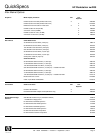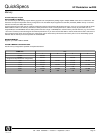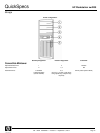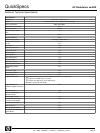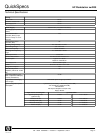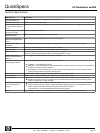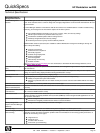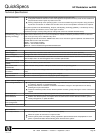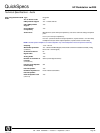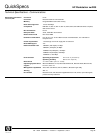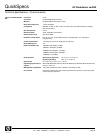
ROM Features
Description
Instantly Available PC
(Suspend to RAM – S3)
Allows for very low power consumption with quick resume time
ROM Based F10 Setup
Review and customize BIOS settings
Remote System Installation via
F12 (PXE) (Remote Boot from
Server)
Allows a new or existing system to boot over the network and download software, including the operating system
System/Emergency ROM Flash
Recovery with Video
Recovers corrupted system BIOS
Auto Setup when New
Hardware Installed
System automatically detects addition of new hardware
Serial, Parallel, USB, Audio,
Network, Enable/Disable Port
Control
Enable or disables serial, parallel, USB, audio, and network ports
Removable Media Write/
Boot Control
Prevents ability to boot from removable media on supported devices (and can disable writes to media)
Power-On Password
Prevents an unauthorized person from booting up the computer
Setup Password
Prevents an unauthorized person from changing the system configuration
Replicated Setup
Saves BIOS settings to diskette or USB disk-on-key in human readable file. Repset.exe utility can then replicate these
settings on machines being deployed without entering ROM-based F10 setup
Memory Change Alert
(Requires HP Client Manager
Software)
Alerts management console if memory is removed or changed
Thermal Alert (Requires HP
Client Manager Software)
Monitors the temperature state within the chassis. Three modes:
NORMAL – normal temperature ranges
ALERTED – excessive temperatures are detected. Raises a flag so action can be taken to avoid shutdown or
provide for a smoother system shutdown
SHUTDOWN – excessive temperatures are encountered. Automatically shuts down the computer without
warning before hardware component damage occurs
Master Boot Record Security
Detects changes to MBR and optional restoration, useful in protecting from viruses
Remote ROM Flash
Provides secure, fail-safe ROM image management from a central network console
Remote Wakeup
System administrators can power on, restart, and power off a client computer from a remote location.
Enables cost-effective power consumption when the administrator needs to distribute software, perform
security management, or update the ROM
ACPI (Advanced Configuration
and Power Management
Interface)
Allows the system to wake from a low power mode
Controls system power consumption, making it possible to place individual cards and peripherals in a low-
power or powered-off state without affecting other elements of the system
Supports ACPI 2.0 for full compatibility with 64-bit operating systems
SMBIOS
System Management BIOS 2.3.5, previously known as DMI BIOS, for system management information
QuickSpecs
HP Workstation xw4200
Technical Specifications
DA - 12022 Worldwide — Version 6 — September 1, 2004
Page 18




